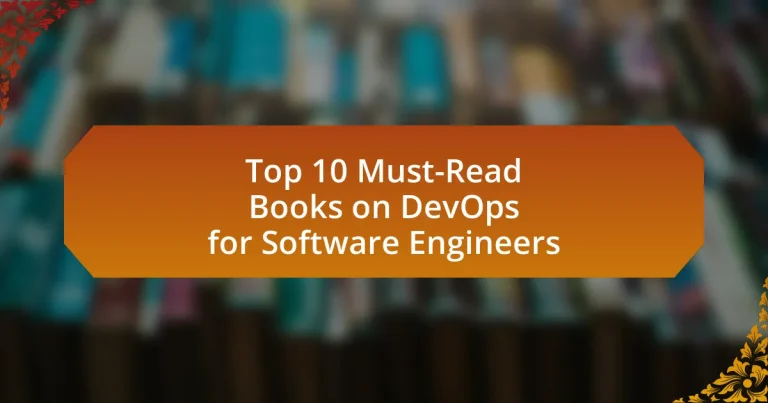The article presents a curated list of the top 10 must-read books on DevOps specifically for software engineers. It highlights essential titles such as “The Phoenix Project,” “The DevOps Handbook,” and “Accelerate,” each offering unique insights into DevOps principles, practices, and methodologies. The article emphasizes the importance of reading these books to enhance understanding of collaboration, automation, and continuous delivery, which are critical for improving software development efficiency. Additionally, it discusses the criteria for selecting these books, the authors’ backgrounds, and the common themes addressed, providing a comprehensive resource for software engineers looking to deepen their knowledge of DevOps.

What are the Top 10 Must-Read Books on DevOps for Software Engineers?
The top 10 must-read books on DevOps for software engineers are:
- “The Phoenix Project” by Gene Kim, Kevin Behr, and George Spafford – This novel illustrates the principles of DevOps through a fictional narrative, emphasizing the importance of collaboration and efficiency in IT.
- “The DevOps Handbook” by Gene Kim, Patrick Debois, John Willis, and Jez Humble – This comprehensive guide provides actionable insights and best practices for implementing DevOps in organizations.
- “Accelerate: The Science of Lean Software and DevOps” by Nicole Forsgren, Jez Humble, and Gene Kim – This book presents research-backed findings on how to improve software delivery performance.
- “Site Reliability Engineering” by Niall Richard Murphy, Jennifer Petoff, and Betsy Beyer – This book offers insights into the practices and principles of site reliability engineering, which aligns closely with DevOps.
- “The Lean Startup” by Eric Ries – While not exclusively about DevOps, this book introduces lean principles that can enhance DevOps practices by promoting rapid experimentation and validated learning.
- “Continuous Delivery” by Jez Humble and David Farley – This book focuses on the principles and technical practices that enable rapid, reliable software delivery.
- “The Phoenix Project: A Novel About IT, DevOps, and Helping Your Business Win” by Gene Kim – This book is a fictional narrative that illustrates the challenges and solutions in adopting DevOps.
- “DevOps for the Modern Enterprise” by Mirco Hering – This book provides a practical approach to implementing DevOps in large organizations, focusing on culture and collaboration.
- “The DevOps 2.0 Toolkit” by Viktor Farcic – This book offers a hands-on approach to implementing DevOps practices using modern tools and technologies.
- “The Unicorn Project” by Gene Kim – This novel complements “The Phoenix Project” and focuses on the developer’s perspective in a DevOps transformation.
These books are essential for software engineers looking to deepen their understanding of DevOps principles and practices.
Why is reading about DevOps important for software engineers?
Reading about DevOps is important for software engineers because it enhances their understanding of the integration between development and operations, leading to improved collaboration and efficiency. DevOps practices, such as continuous integration and continuous deployment, enable software engineers to deliver high-quality software faster and with fewer errors. According to the 2021 State of DevOps Report, organizations that adopt DevOps practices experience 2.5 times more frequent code deployments and 24 times faster recovery from failures, demonstrating the tangible benefits of DevOps knowledge for software engineers.
How can DevOps literature enhance a software engineer’s skills?
DevOps literature enhances a software engineer’s skills by providing insights into best practices, tools, and methodologies that streamline software development and operations. By studying concepts such as continuous integration, continuous delivery, and infrastructure as code, engineers can improve their efficiency and collaboration within teams. Research indicates that organizations implementing DevOps practices experience a 200% increase in deployment frequency and a 24% reduction in change failure rates, demonstrating the tangible benefits of adopting these principles. This literature equips engineers with the knowledge to foster a culture of collaboration and innovation, ultimately leading to higher quality software and faster delivery times.
What role does continuous learning play in DevOps?
Continuous learning is essential in DevOps as it fosters a culture of improvement and adaptability. In the rapidly evolving tech landscape, teams must continuously update their skills and knowledge to effectively implement new tools, practices, and methodologies. Research indicates that organizations that prioritize continuous learning in their DevOps practices experience higher performance and innovation rates, as they can quickly respond to changes and challenges in the software development lifecycle. This commitment to learning not only enhances individual competencies but also strengthens team collaboration and overall organizational agility.
What criteria were used to select these top 10 books?
The criteria used to select these top 10 books on DevOps for software engineers include relevance to current industry practices, author expertise, and reader reviews. Each book was evaluated based on its practical applicability to DevOps methodologies, the credentials of the authors in the field, and the overall reception by readers, which reflects its effectiveness and usefulness in real-world scenarios. This selection process ensures that the books provide valuable insights and actionable strategies for software engineers looking to enhance their understanding and implementation of DevOps principles.
How do the authors’ backgrounds influence the content of these books?
The authors’ backgrounds significantly influence the content of the books on DevOps for software engineers by shaping their perspectives, expertise, and practical experiences. For instance, authors with extensive industry experience often incorporate real-world case studies and practical applications, making the content more relevant and actionable for readers. Additionally, authors with academic backgrounds may focus on theoretical frameworks and methodologies, providing a deeper understanding of DevOps principles. This blend of practical and theoretical insights enriches the content, ensuring it addresses both the technical and cultural aspects of DevOps, which are crucial for successful implementation in software engineering.
What themes are commonly addressed in these selected books?
Common themes addressed in the selected books on DevOps for software engineers include collaboration, automation, continuous integration and delivery, and cultural transformation. These themes emphasize the importance of teamwork across development and operations, the role of automation in improving efficiency, the necessity of integrating and delivering code continuously to enhance software quality, and the need for a cultural shift within organizations to embrace agile practices. Each theme is supported by case studies and best practices that illustrate their impact on successful DevOps implementations.

What are the key takeaways from each of the top 10 books?
-
“The Phoenix Project” by Gene Kim, Kevin Behr, and George Spafford emphasizes the importance of DevOps in improving IT performance and business outcomes through collaboration and continuous improvement.
-
“The DevOps Handbook” by Gene Kim, Patrick Debois, John Willis, and Jez Humble provides a comprehensive framework for implementing DevOps practices, focusing on the integration of development and operations to enhance software delivery.
-
“Accelerate” by Nicole Forsgren, Jez Humble, and Gene Kim presents research-backed insights on how technology and organizational practices drive high performance in IT, highlighting the significance of continuous delivery and lean management.
-
“Site Reliability Engineering” by Niall Richard Murphy, Jennifer Petoff, and Chris Jones outlines the principles and practices of SRE, emphasizing reliability, scalability, and the importance of measuring service performance.
-
“The Phoenix Project” by Gene Kim, Kevin Behr, and George Spafford illustrates the transformation of a struggling IT department through DevOps principles, showcasing the impact of effective communication and teamwork.
-
“Continuous Delivery” by Jez Humble and David Farley details the practices and principles necessary for automating software delivery, emphasizing the need for a robust deployment pipeline to reduce risks and improve quality.
-
“The Lean Startup” by Eric Ries introduces lean principles to software development, advocating for rapid experimentation and validated learning to create successful products efficiently.
-
“The DevOps Adoption Playbook” by Sanjeev Sharma provides a strategic approach to adopting DevOps, focusing on cultural change, leadership, and the alignment of IT with business goals.
-
“Release It!” by Michael T. Nygard discusses the importance of designing software for production environments, emphasizing resilience and the need for systems to handle real-world conditions.
-
“The Phoenix Project” by Gene Kim, Kevin Behr, and George Spafford serves as a narrative that illustrates the challenges and solutions in IT operations, reinforcing the value of DevOps in achieving organizational goals.
How does each book contribute to understanding DevOps principles?
Each book in the “Top 10 Must-Read Books on DevOps for Software Engineers” contributes to understanding DevOps principles by providing unique insights, methodologies, and case studies that illustrate the core concepts of DevOps. For instance, “The Phoenix Project” offers a narrative that highlights the importance of collaboration and communication in IT operations, demonstrating how these elements lead to improved efficiency and productivity. “The DevOps Handbook” serves as a comprehensive guide, detailing best practices and frameworks that organizations can adopt to implement DevOps successfully. “Accelerate” presents empirical research showing the impact of DevOps practices on organizational performance, providing data-driven evidence that supports the adoption of these principles. Each book reinforces the understanding of DevOps by combining theoretical knowledge with practical applications, making the principles accessible and actionable for software engineers.
What unique perspectives does each author bring to the DevOps conversation?
Each author in the DevOps conversation contributes distinct insights shaped by their professional backgrounds and experiences. For instance, Gene Kim emphasizes the importance of integrating development and operations to enhance organizational performance, drawing from his extensive experience in IT management and software development. Jez Humble focuses on the principles of continuous delivery, advocating for automation and feedback loops, which he supports with empirical data from successful implementations. Patrick Debois, known as the father of DevOps, brings a perspective rooted in agile methodologies and collaboration, highlighting the cultural shifts necessary for effective DevOps practices. These unique viewpoints collectively enrich the DevOps dialogue, providing a multifaceted understanding of its principles and practices.
Which practical tools and methodologies are discussed in these books?
The practical tools and methodologies discussed in the books on DevOps for software engineers include Continuous Integration (CI), Continuous Deployment (CD), Infrastructure as Code (IaC), and Agile methodologies. These concepts are foundational in modern software development practices, enabling teams to automate processes, improve collaboration, and enhance software delivery speed. For instance, CI and CD facilitate automated testing and deployment, while IaC allows for the management of infrastructure through code, promoting consistency and scalability. Agile methodologies support iterative development and responsiveness to change, which are critical in a DevOps environment.
What are the most impactful case studies or examples presented?
The most impactful case studies presented in the context of DevOps include the transformation of Netflix, which adopted a microservices architecture to enhance scalability and deployment speed, resulting in a 99.99% uptime. Another significant example is Amazon, which implemented continuous delivery practices, allowing for thousands of deployments per day and significantly reducing time to market. These case studies illustrate the effectiveness of DevOps principles in achieving operational excellence and rapid innovation in software development.
How do these case studies illustrate successful DevOps implementations?
These case studies illustrate successful DevOps implementations by showcasing measurable improvements in deployment frequency, lead time for changes, and mean time to recovery. For instance, organizations that adopted DevOps practices reported a 200 times increase in deployment frequency and a 24 times faster lead time for changes, as highlighted in the 2019 State of DevOps Report by Puppet. Additionally, these case studies demonstrate enhanced collaboration between development and operations teams, leading to reduced silos and improved communication, which are critical for achieving continuous delivery and integration.
What lessons can be learned from the failures discussed in these books?
Failures discussed in the books on DevOps highlight the importance of continuous improvement and the need for effective communication within teams. These failures often stem from inadequate collaboration, leading to misaligned goals and inefficient processes. For instance, the book “The Phoenix Project” illustrates how siloed departments can hinder project success, emphasizing that cross-functional teamwork is essential for overcoming obstacles. Additionally, “Accelerate” provides evidence that organizations with high-performing teams achieve better outcomes, reinforcing the lesson that investing in team dynamics and culture is crucial for success in DevOps practices.

How can software engineers apply insights from these books in their work?
Software engineers can apply insights from DevOps books by integrating best practices for collaboration, automation, and continuous delivery into their workflows. For instance, books like “The Phoenix Project” emphasize the importance of cross-functional teams, which can lead to improved communication and faster problem resolution. Additionally, “Accelerate” provides data-driven strategies for enhancing software delivery performance, enabling engineers to implement metrics that track deployment frequency and lead time. By adopting these principles, software engineers can streamline processes, reduce bottlenecks, and ultimately deliver higher-quality software more efficiently.
What best practices can be derived from the top 10 books?
Best practices derived from the top 10 books on DevOps for software engineers include implementing continuous integration and continuous deployment (CI/CD) pipelines, fostering a culture of collaboration between development and operations teams, and automating testing and infrastructure management. These practices enhance software delivery speed and reliability. For instance, the book “The Phoenix Project” emphasizes the importance of cross-functional teams to improve workflow efficiency, while “Accelerate” provides empirical evidence that organizations adopting CI/CD practices achieve higher performance metrics.
How can engineers integrate DevOps principles into their daily workflows?
Engineers can integrate DevOps principles into their daily workflows by adopting continuous integration and continuous deployment (CI/CD) practices. Implementing CI/CD allows engineers to automate testing and deployment processes, which enhances collaboration and reduces the time to deliver software. According to the 2021 State of DevOps Report, organizations that implement CI/CD practices experience 46 times more frequent code deployments and 440 times faster lead time for changes. This data underscores the effectiveness of CI/CD in streamlining workflows and fostering a DevOps culture.
What common pitfalls should engineers avoid when adopting DevOps practices?
Engineers should avoid the common pitfalls of inadequate communication, insufficient automation, and neglecting cultural change when adopting DevOps practices. Inadequate communication can lead to misunderstandings and misalignment between development and operations teams, which hinders collaboration and slows down delivery. Insufficient automation of processes can result in manual errors and inefficiencies, undermining the benefits of DevOps. Neglecting cultural change is critical, as a successful DevOps implementation requires a shift in mindset towards collaboration, shared responsibility, and continuous improvement. Research indicates that organizations that prioritize these aspects see a 200% improvement in deployment frequency and a 50% reduction in lead time, highlighting the importance of addressing these pitfalls.
What resources are available for further exploration of DevOps?
Books, online courses, and community forums are key resources for further exploration of DevOps. Notable books include “The Phoenix Project” by Gene Kim, Kevin Behr, and George Spafford, which illustrates DevOps principles through a fictional narrative, and “Accelerate” by Nicole Forsgren, Jez Humble, and Gene Kim, which provides research-backed insights into high-performing IT organizations. Online platforms like Coursera and Udacity offer courses on DevOps practices and tools, while forums such as DevOps Subreddit and Stack Overflow facilitate community discussions and knowledge sharing. These resources collectively enhance understanding and application of DevOps methodologies.
How can online communities enhance learning about DevOps?
Online communities enhance learning about DevOps by providing collaborative platforms for knowledge sharing and real-time problem-solving. These communities facilitate discussions among practitioners, enabling members to share experiences, best practices, and resources related to DevOps methodologies. For instance, platforms like GitHub and Stack Overflow allow users to engage in code reviews and troubleshooting, which fosters a deeper understanding of DevOps tools and processes. Additionally, studies show that peer interactions in online forums can significantly improve skill acquisition and retention, as learners benefit from diverse perspectives and collective expertise.
What additional reading materials complement the top 10 books?
Additional reading materials that complement the top 10 books on DevOps for software engineers include industry whitepapers, online courses, and relevant blogs. Whitepapers from organizations like the DevOps Institute provide insights into best practices and emerging trends in DevOps. Online courses from platforms such as Coursera and Udacity offer structured learning paths that enhance the knowledge gained from the books. Additionally, blogs like those from DZone and the Atlassian blog feature articles that discuss real-world applications and case studies, further enriching the understanding of DevOps concepts. These materials collectively provide a broader context and practical applications that align with the themes presented in the top 10 books.
What are some practical tips for getting started with DevOps?
To get started with DevOps, focus on fostering a culture of collaboration between development and operations teams. This cultural shift is essential as it encourages shared responsibilities and improves communication, leading to faster delivery and higher quality software. Implementing continuous integration and continuous deployment (CI/CD) practices is also crucial; these practices automate testing and deployment processes, reducing manual errors and speeding up release cycles. Additionally, utilizing infrastructure as code (IaC) tools, such as Terraform or Ansible, allows for consistent and repeatable infrastructure management, which is vital for scaling applications efficiently. According to the 2021 State of DevOps Report, organizations that adopt DevOps practices experience 2.5 times more frequent code deployments and 24 times faster recovery from failures, highlighting the effectiveness of these strategies.


